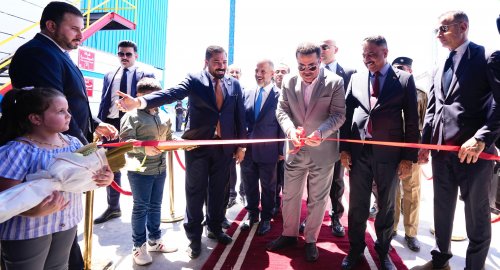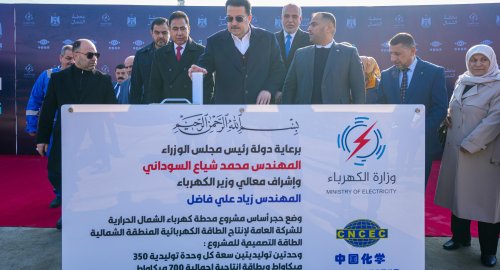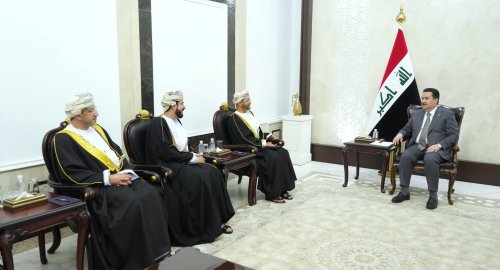
Al-Sudani Inaugurates Four Factories of MOD Industries Commission

- 20-07-2024, 17:34
Baghdad-INA
Prime Minister Mohammed S. Al-Sudani inaugurated several defense production factories and rehabilitation facilities at the State Company for Military Industries within the industrial complex of the Defence Industries Commission in southern Baghdad. During his visit, he also reviewed the work and production of other military factories.
The Prime Minister's Media Office stated in a statement received by the Iraqi News Agency (INA), that "The Prime Minister inaugurated the Light Ammunition Production Plant, the Quality Testing Laboratories and Shooting Ranges for Light Ammunition, the Mortar Shells Plant, and the Hot Forging and Aluminum Injection Workshops. Additionally, he opened the Iron Alloys and Colored Metals Plant at the State Company for Military Industries.".
During his visit to the complex, Prime Minister Al-Sudani also inaugurated the first phase of the Transformer Distribution and Power Maintenance Workshop and agreed to contract with the Ministry of Electricity based on the workshop's annual production capacity.
The Prime Minister launched the execution of the Capsule Factory for light ammunition and the Gunboat and Civilian Boat Production Plant. He also reviewed the progress of the Medium Ammunition and Oil Production projects and monitored the work at the Electric Vehicle Production Plant, which was implemented in partnership with the private sector and is expected to open by the end of this year. Furthermore, he examined the progress of the execution at the Light Ammunition Plant.
In his address, Prime Minister Al-Sudani commended the efforts of the Defence Industries Commission and its staff, acknowledging their expertise and notable contributions to the Iraqi military industry. He also appreciated the efforts of Iraqi and friendly companies, emphasizing that since the enactment of the Defence Industries Commission Law (No. 25 of 2019), several factories have been launched, and foundations for others have been laid, with nearly 12 factories expected to be completed by the end of this year as part of the government's developmental program.
Prime Minister Al-Sudani underscored that military production, whether for various ammunition or civilian needs like those of the Ministry of Electricity, not only saves foreign currency but is also a fundamental requirement for Iraqi sovereignty. He directed security ministries to adopt the Defence Industries Commission's products to meet their needs and instructed the Ministry of Defence to review all armament contracting committees and the delivery of scrap material. The Defence Industries Commission is expected to provide a status report within a week.
Key points from the Prime Minister's speech:
- The Defence Industries Commission has taken significant steps toward establishing a defensive military industry through the efforts and expertise of its personnel.
- We are witnessing products that meet standards and reliability, produced using the latest production lines.
- There is a high level of dedication, capability, vision, and readiness among the State Company for Military Industries.
- Today, we are laying the foundation for a military industry that ensures sovereignty by meeting the needs of our security forces.
- While terrorist groups have been eliminated, challenges remain, including The threat of sleeper cells with extremist ideologies and security challenges at Iraq's borders.
- The region is experiencing unprecedented regional and international developments in military capabilities.
- We must have a vision, planning, and a military industry that ensures Iraq's security, sovereignty, and unity through an advanced military industry.
- We have a clear law and continuous support for the military industry through Cabinet decisions that allocate financial resources or ensure the provision of raw materials.
The Cabinet's decisions on securing raw materials for military manufacturing companies must be implemented strictly.
According to the law, military production is marketed to security ministries, and there is no justification for any security entity not to meet its needs from the Defence Industries Commission's products.
We call on members of Parliament to exercise their oversight role and scrutinize any armament import contracts, which will be subject to accountability by both executive and legislative oversight bodies.
The Ministry of Interior has made significant progress in contracting with the Defence Industries Commission.
All other security agencies have been directed to adhere to the Cabinet's decision, which is not subject to the discretion of any security official supporting the military industry with the state.
Al-Sudani launches construction of North Thermal Power Plant
- politics
- 12:03
PM Al-Sudani arrives in Nineveh
- politics
- 10:17
China Says It 'Firmly Opposes' US Military Aid To Taiwan
- International
- 07:36
First joint picture of Greenland Ice Sheet melting, ESA
- Multimedia
- 09:28
US Central Command: We killed ISIS terrorist leader Abu Yusuf in Syria
- International
- 24/12/20
Liverpool compete with Real Madrid to sign Olympique Lyonnais star
- Security
- 24/12/19
ISC, ADX discuss Strengthening Economic Ties
- Economy
- 24/12/16
Iraq assumes presidency of Arab Investment Company’s Executive Board
- Economy
- 24/12/17












